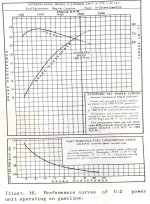mwood
Silver Member
What I was told is as follows. I believe it is correct and seems to be an easier way to understand all that has been said.
Take a diesel engine and a gas engine that produce the same amount of torque at rated speed. (Let's say 2200 RPM for the deisel and 5600 RPM for the gas).
IF you had the gas and the deisel at rated speed, then yes, the torque would be the same. A few points to ponder here as to why deisel is superior for work:
1. You have to get to rated speed before this works. Therefore, when you put the plow in the ground and start to move forward, the gas engine will have much less torque at the wheels since it is starting below rated speed and it has such a sharp torque curve. However, with the flatter curve of the deisel, you may not be getting max torque, but you are getting much more than the gas engine.
2. Once you achieve optimum engine speed, it's very hard to maintain it (especially when driving a truck). Look at a high HP gas engine. The torque curve drops off sharply on either side of the peak. Therefore, you usually have around a 500 RPM window when the gas engine is going to pull well. With a deisel, you may have closer to a 700 RPM window. When you factor in gears for a truck, that 700 RPM window is a much greater percentage of the max RPM and therefore, a much greater speed range. Hence why deisels don't have to downshift as much.
Just a couple of points to ponder. I tried to keep this as simple as possible for easy explanation to one who isn't an engineer... /forums/images/graemlins/tongue.gif
Take a diesel engine and a gas engine that produce the same amount of torque at rated speed. (Let's say 2200 RPM for the deisel and 5600 RPM for the gas).
IF you had the gas and the deisel at rated speed, then yes, the torque would be the same. A few points to ponder here as to why deisel is superior for work:
1. You have to get to rated speed before this works. Therefore, when you put the plow in the ground and start to move forward, the gas engine will have much less torque at the wheels since it is starting below rated speed and it has such a sharp torque curve. However, with the flatter curve of the deisel, you may not be getting max torque, but you are getting much more than the gas engine.
2. Once you achieve optimum engine speed, it's very hard to maintain it (especially when driving a truck). Look at a high HP gas engine. The torque curve drops off sharply on either side of the peak. Therefore, you usually have around a 500 RPM window when the gas engine is going to pull well. With a deisel, you may have closer to a 700 RPM window. When you factor in gears for a truck, that 700 RPM window is a much greater percentage of the max RPM and therefore, a much greater speed range. Hence why deisels don't have to downshift as much.
Just a couple of points to ponder. I tried to keep this as simple as possible for easy explanation to one who isn't an engineer... /forums/images/graemlins/tongue.gif



